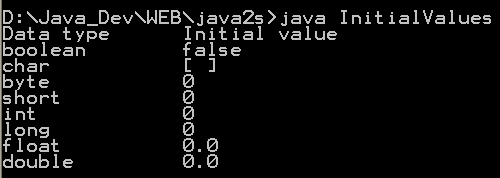Shows default initial values

// : c04:InitialValues.java
// Shows default initial values.
// From 'Thinking in Java, 3rd ed.' (c) Bruce Eckel 2002
// www.BruceEckel.com. See copyright notice in CopyRight.txt.
public class InitialValues {
boolean t;
char c;
byte b;
short s;
int i;
long l;
float f;
double d;
void print(String s) {
System.out.println(s);
}
void printInitialValues() {
print("Data type Initial value");
print("boolean " + t);
print("char [" + c + "]");
print("byte " + b);
print("short " + s);
print("int " + i);
print("long " + l);
print("float " + f);
print("double " + d);
}
public static void main(String[] args) {
InitialValues iv = new InitialValues();
iv.printInitialValues();
/*
* You could also say: new InitialValues().printInitialValues();
*/
}
} ///:~
Related examples in the same category